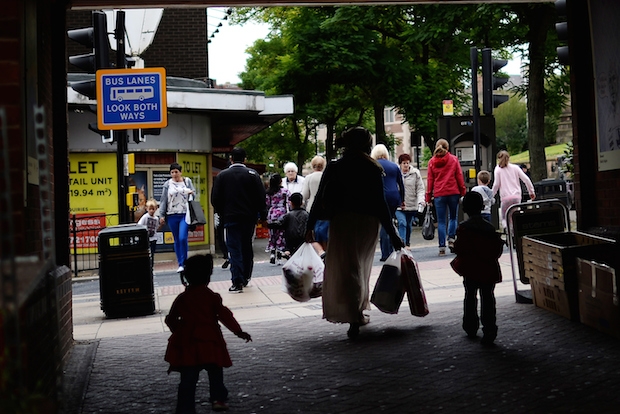Day two of the Rotherham scandal—or rather the fallout from the latest report on it—and there’s a marked, obvious change in the coverage of it from the last time the subject surfaced. It may be the sheer scale of the thing —1,400 girls, and counting—and the horror of the cruelties perpetrated on the victims, but I don’t think that anyone is now trying to evade the reality of the thing: that the perpetrators were overwhelmingly men of Pakistani Muslim background and the victims white. But that, I think, is squarely down Alexis Jay’s report, which made the point not only that the rapists and abusers were from one ethnic and religious group and the victims from another, but that this was the main reason why council workers, social workers and police sat on the evidence rather than acting on it. Had it been your normal circle of paedophiles, I don’t think it would have taken 16 years to acknowledge the problem and act on it, do you?
On the previous occasion the BBC went with the issue the news bulletin was invariably followed by a little lecture from the correspondent, or a statement from a children’s charity, to the effect that child abuse was a problem for all communities and that it would be quite quite wrong to stigmatise any one ethnic or religious group for something that affects the whole of society. The first court case involving Muslim/Asian men preying on white girls that I remember the BBC reporting on—it may have been Oxfordshire rather than Rotherham—was conspicuous for the fact that the ethnicity and religion of the rapists was barely mentioned. Funny, I thought, after hearing the names read out; there’s a common denominator here. But analysis came there none.
And that was part of the problem. If the glaringly obvious feature of abuse on this extraordinary scale—and I’m trying really hard to avoid nouns like ‘epidemic’—was out of bounds as a subject, then plainly addressing the cause of the abuse was going to be impossible. Jack Straw, to his credit, raised the issue of how Muslim-Pakistani men regard white girls as ‘easy meat’ and Lord Ahmed, the Labour peer, said that he believes there is a link between first-cousin marriages and sex crimes by Asian men:
‘This didn’t happen in my or my father’s generation. This is happening among young Pakistanis. While I respect individual choice, I think the community needs to look at marriages in the UK rather than cousin marriages or economic marriages from abroad.’
That was three years ago. But, as the report on abuse in Rotherham makes embarrassingly clear, the ethnic character of the predation was the reason why the initial police report was simply stuffed under the sofa (and in passing, this oversight shouldn’t be investigated by the same force that perpetrated it).
In the Catholic Church, there’s such a thing as sins of omission, which may be every bit as serious as sins of commission; does the law not cover offences relating to neglect of duty or criminal incompetence on the part of those with responsibility to protect the vulnerable?
We shouldn’t need to say this, but the background of the perpetrators of child sex abuse is crucial to any understanding of it. And of course we know that most sex abuse takes place within the family – it happens where it’s easiest to perpetrate. But that doesn’t exculpate those who are blind to crimes committed elsewhere. When the issue was abuse in the Catholic Church, the church underwent prolonged soul searching about the background of individuals accepted for the priesthood and about the requirement for priestly celibacy (though the issue was power, not celibacy). In England, the church commissioned the Nolan report on child protection, which was a model of its kind.
When it came to the abuse of minors by celebs like Jimmy Savile, we examined our collective conscience about the cult of celebrity and the immunity it seemed to convey to those in that bubble; we’re still agonising about it.
The same should apply to the Rotherham/Bradford/Oxfordshire rapes of children and young girls; if the perpetrators are overwhelmingly the products of a single culture then that group needs to engage in its own collective crisis of conscience. As for the police and social services and indeed the Labour Party for whom the sensitivities of immigrant groups trumped every other consideration, well, I think we know what to do.







Comments